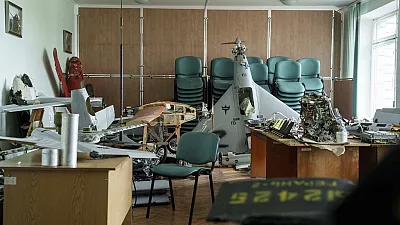A group of African women, lured by promises of work and education opportunities in Russia, have found themselves working in drone production for the war in Ukraine. The recruits, primarily from African countries such as Uganda, Rwanda, and Nigeria, were enticed through social media ads offering jobs in hospitality and other sectors, but upon arrival, they discovered a much darker reality.
These women, aged between 18 and 22, were instead assigned to assemble drones at a factory in Tatarstan’s Alabuga Special Economic Zone. The factory, once a hub for civilian industry, has shifted focus toward military production, particularly the manufacturing of Iranian-designed Shahed-136 drones that are being used in Russia’s conflict with Ukraine.
According to reports from some of the women, the working conditions are harsh. The recruits spoke to the Associated Press (AP) on the condition of anonymity, detailing how they are under constant surveillance and subjected to long working hours. Many also reported significant discrepancies between the promised wages and what they ultimately received. Furthermore, some of the women have had to handle caustic chemicals without adequate protective gear, leading to severe skin irritations and other health concerns.
One woman recounted her initial excitement about the job opportunity, documenting her journey to Russia on social media with a series of selfies and videos. However, upon arrival, the reality set in—she described the situation as a “trap,” lamenting that the job was nothing like what was advertised.
The factory is a critical part of Russia’s drone production infrastructure, aiming to produce 6,000 drones annually by 2025. Leaked documents and satellite imagery reviewed by AP revealed the rapid expansion of the Alabuga complex and its strategic importance in the ongoing war effort.
Also, read; Met Gala Names All-Black Male Co-Chairs for the First Time in History
Recruitment efforts for these jobs are expanding beyond Africa, with candidates now being sourced from Asia and South America as well. Despite the exploitation and poor working conditions, the Alabuga Start program, which facilitates the recruitment of foreign workers, continues to market itself as a legitimate opportunity for young people to gain new skills and earn money. However, the true nature of the work is becoming increasingly clear, with many analysts raising concerns about the ethical implications of Russia’s recruitment tactics.
Human rights organizations have started paying attention to these alarming developments, warning that the deceptive recruitment and the exploitative labor conditions could amount to human trafficking. Uganda’s Minister for Gender, Labour, and Social Development has expressed concern, stating that the government is investigating the situation to ensure that the women involved are not subjected to exploitative employment.
Meanwhile, the women remain stuck in difficult conditions, far from home, with little recourse. Despite some efforts by individuals to leave the factory, it remains unclear how many have successfully escaped the harsh realities of their work. The broader implications of this situation continue to unfold, raising questions about the lengths to which nations like Russia will go to sustain their military efforts during times of conflict.

